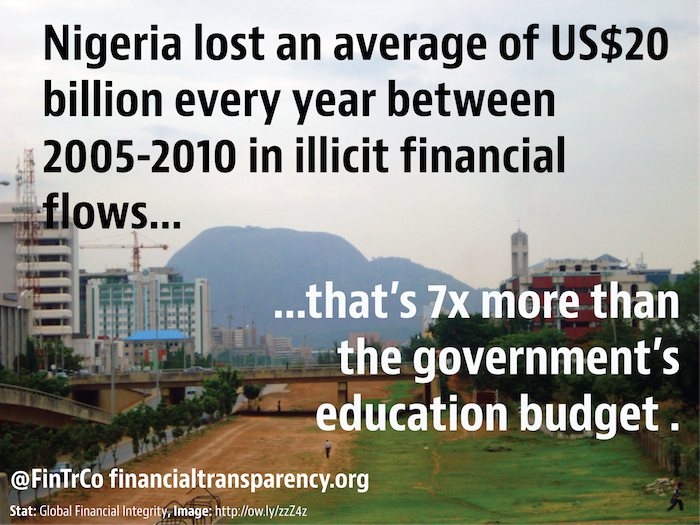Nigeria Has Potential, But Needs to Stomp Out Illicit Financial Flows First
July 25th, 2014
July 25th, 2014
A new report out from the McKinsey Global Institute claims that Nigeria could be the next hotspot for economic growth and development. The firm says that, by 2030, the west African nation could become one of the world’s leading economies.
And it’s true; Nigeria has seen an economic surge in recent years, thanks to massive oil exploitation, a burgeoning financial sector, and Africa’s largest population. In April, Nigeria even leapfrogged South Africa on its way to becoming the continent’s biggest economy.
But even with annual GDP growth at 7%, millions of Nigerians suffer from poverty. With an average life expectancy of just 52 years and 46% of the population living below the national poverty line, a huge undertaking lies ahead if Nigeria wants to not only grow, but grow equitably.
One of the most significant burdens to a country as large, diverse, and resource-rich as Nigeria is illicit financial flows–money that’s illegally earned, transferred or utilized. This exiting of money is due to a number of different factors, including corporate tax evasion, trade misinvoicing (the act of under- or over-valuing goods so that a business can move money into or out of a country undetected) or grand corruption and embezzlement.
Between 2005 and 2010, Nigeria lost, on average, roughly US$20 billion every year to illicit financial flows, according to data from FTC member, Global Financial Integrity.

Twenty billion dollars is roughly four percent of Nigeria’s total GDP. That’s almost seven times the amount allocated for education spending in the 2014 Nigerian budget. Instead of revenue to spend on roads, schools, and hospitals, Nigeria and countries across the globe are seeing huge sums of money flow out of their economies and into anonymous companies and hidden bank accounts in tax havens.
Earlier this year, the United States Justice Department announced that it froze more than US$458 million embezzled by former Nigerian dictator, General Sani Abacha. Gen. Abacha and his associates used anonymous companies in the British Virgin Islands, Jersey, and the UK to loot an estimated US$3-5 billion from government coffers.
When you can hide the identity of the beneficial owner–the person who’s really behind the company–tracking down illicit money takes time. Gen. Abacha died 16 years ago. With open public registers of beneficial ownership, authorities, journalists, and concerned citizens would have a much easier time following the money.
So it’s true that Nigeria is growing at an unbelievable pace. But what would that growth look like if billions of dollars weren’t leaving illicitly every year? This isn’t just a problem for Nigerian citizens, either. Bankers, accountants, and lawyers in financial centers in the US and Europe are some of the most willing enablers of illicit money, anonymous companies, and hidden bank accounts.
We often hear predictions about the next big economy to break through, but until illicit financial flows are tackled, the next big breakthrough may always be just out of reach.